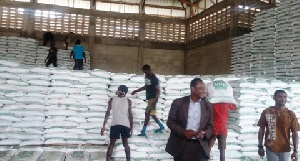 Fertilizers for the programme being packed
Fertilizers for the programme being packed
Farmers in the Ejura-Sekyedumase Municipality and environs have indicated that government’s ‘Planting for Food and Jobs’ programme will help increase their yields and change their economic situation.
According to them, the flagship programme will boost food production, create jobs for the teeming youth and also alleviate poverty in the area.
At Ejura, Nsuta, Kwaman and other communities, the farmers told DAILY GUIDE that the government was committed to boosting food production.
Emmanuel Yeboah, a maize farmer at Kyenkyenkura, said he was likely to record about 50 percent improvement in yields because of the provision of quality seeds and fertilizers by government.
“I’m really happy about the programme and inputs support received from the government. Many of my colleagues are quite encouraged and convinced that it will continue,” he indicated.
His counterpart, Abdul Mohammed from the same community, stated that through the programme, he would expand his farms and acquire more wealth.
Another farmer, Oheneba Dwumor, disclosed that farmers at Dekyembuoso have embraced the programme and transform from subsistent farming to commercial.
Member of Parliament (MP) for Ejura-Sekyedumase, Alhaji Mohammed Issifu Pangabu, who is a commercial farmer, told the paper that the government’s project would help him to double the production of corn, cassava and soybeans, among others.
He called on all Ghanaians to embrace the programme and give it the needed support, pointing out that he had been offered 1,600 acres to the Ministry of Food and Agriculture to grow seeds this year alone.
“You can see that the road leading to Ejura is bustling. Trucks loaded with inputs are moving to and fro; and this is why I don’t want anybody to politicize this programme. It has come to support Ghanaian farmers and not political party activists,” the MP indicated.
Regional Director of MoFA, Joseph Faalong, said the ‘Planting for food and Jobs’ programme is to promote food production and create jobs across the country for the teeming youth.
“It is also to encourage all Ghanaians to grow some cereals or vegetables on their farms or backyards, and it covers all the 216 districts across the country. Government will provide subsidized inputs and purchase the inputs on credit,” he disclosed.
According to him, the MoFA had selected some crops and set growth targets for maize production to increase by at least 30 percent, rice production by 49 percent, soybeans by 25 percent and sorghum by 28 percent.